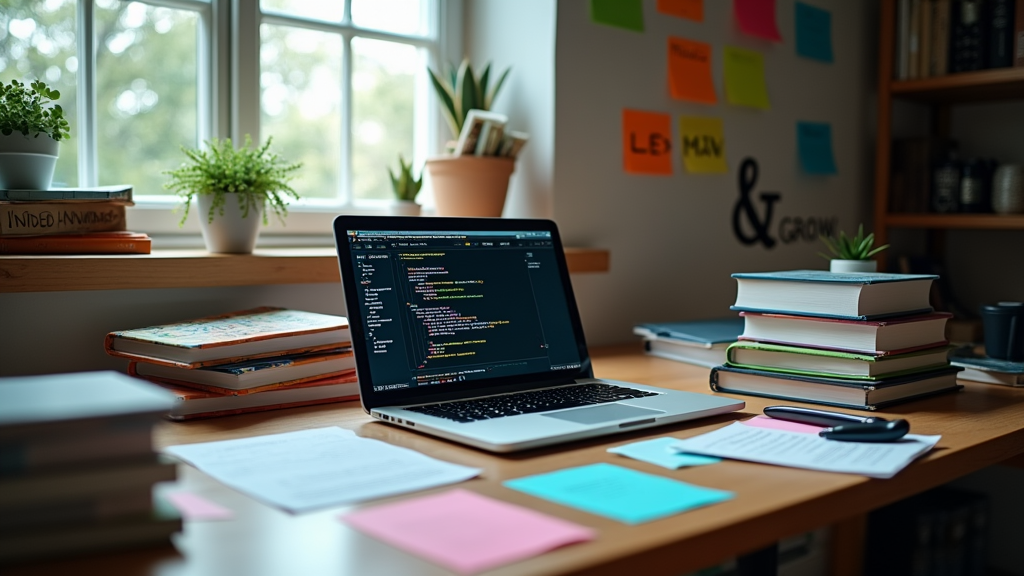
Understanding Indie Development Fundamentals
Indie development means creating games or software without the backing of a big company. You work independently, making your own decisions about what to create and how to sell it. This way of working has grown from a small hobby scene in the early 2000s to a thriving part of the software industry today.
The rise of online stores like Steam and mobile app markets has created real chances for independent creators to succeed. You can now reach millions of potential users directly, and many tools for creating games and apps are free to use.
As you start your journey into indie development, you'll learn about choosing the right tools, planning your projects, and building a community around your work. To help you get started, check out GameDev.net for helpful guides and a supportive community of fellow indie developers.
The Modern Indie Developer Journey
Remember when game developers needed a big publisher's approval to release their games? Those days are gone. You can now create and publish games directly to platforms like Steam or mobile app stores.
Going indie gives you complete creative control over your projects. You get to decide everything from the game concept to monetization strategy, plus you keep a bigger share of the profits.
Many people think indie developers work alone in their basement. The truth is that most successful indie developers team up with others and use online communities for support. They also don't need massive budgets to create great games - creative ideas and good execution matter more than fancy graphics.

Essential Technical Skills Blueprint
Starting your indie development journey requires strong programming fundamentals. You need to master at least one programming language like Python or JavaScript, and understand key concepts such as data structures, algorithms, and object-oriented programming. These basics will help you write clean, efficient code that works well.
The right development tools and frameworks can speed up your work significantly. Pick an integrated development environment (IDE) like Visual Studio Code that matches your programming language. Learn to use version control with Git to track your code changes and work with others.
Keep learning new skills and staying updated with tech changes. Set aside time each week to practice coding, try new tools, or work on side projects that interest you. Join online developer communities where you can ask questions and share knowledge with other indie developers.
Creative Process and Innovation
Coming up with game ideas doesn't have to be complicated. Start by writing down things you enjoy in other games, then mix and match these elements to create something new. Test your ideas by describing them to friends - if their eyes light up, you might be onto something good.
Paper prototypes or simple digital mockups can save you months of work. Focus on creating a basic version of your main game mechanic in just a few days. You can use free tools like Unity or Godot to quickly test if your core gameplay is fun.
Keep improving your game in small steps based on player feedback. Try to release a new version every few weeks and ask players what they think. Small, regular updates work better than big changes - they help you spot problems early and keep your players excited about the game.

Business Strategy for Indies
Starting your indie game development journey doesn't require a huge investment upfront. You can bootstrap your project using personal savings while keeping your day job, or explore crowdfunding platforms like Kickstarter to get community backing. Small business loans and game development grants are also viable options if you need extra funding.
Your game's monetization strategy will greatly impact its success. Free-to-play games can reach a wider audience and generate revenue through in-app purchases or ads. Premium games with a one-time purchase price might bring in less players but offer more predictable income. You could also consider a hybrid approach with a base game and optional downloadable content.
Planning for the long term helps you avoid common indie development pitfalls. Start by creating a realistic budget and timeline, and always keep some funds in reserve for unexpected expenses. Before diving deep into development, you can use tools like FastWaitlist to build an early audience and validate your game concept. This approach helps reduce the risk of developing a game nobody wants to play.
Marketing Your Indie Project
Getting your indie project noticed starts with building a strong online presence. Create social media accounts on platforms where your target audience spends time, like Twitter for game developers or Instagram for visual artists. Your website should clearly show your project's unique features and include a way for people to sign up for updates.
Building relationships with your future users is crucial for success. Join online communities related to your project's niche and share helpful tips or behind-the-scenes content. Remember to spend more time helping others than promoting your work.
Start your marketing efforts at least three months before launch. Send preview copies to reviewers and create excitement with teasers on social media. After release, keep the momentum going by regularly sharing user success stories and responding to feedback quickly.
Building a Supportive Network
Making games alone doesn't mean you have to be lonely. Game development meetups and conferences give you chances to meet other creators face-to-face. These events often include workshops where you can learn new skills and show your games to others.
Having a mentor can speed up your learning process significantly. Many experienced indie developers are happy to share their knowledge with newcomers. You can find potential mentors at game jams or through local developer groups.
The internet makes connecting with other developers easier than ever. Join active Discord servers, Reddit communities, or Twitter groups focused on indie game development. These platforms let you share your work, ask questions, and get feedback from developers worldwide.
- Look for local game development groups on Meetup
- Attend game jams to meet potential collaborators
- Follow and engage with other developers on social media
- Join online communities that match your game's genre or technology
Starting Your Indie Development Journey
Success in indie game development comes from starting small and learning constantly. Your first game doesn't need to be perfect - it needs to be finished.
Pick a simple game idea and start building it today using free tools like Unity or Godot. You can learn the basics through online tutorials and practice by recreating classic games like Pong or Snake.
The indie game community wants you to succeed, so don't hesitate to share your progress and ask for feedback. Remember that every successful indie developer started exactly where you are now - they just took that first step and kept going.
